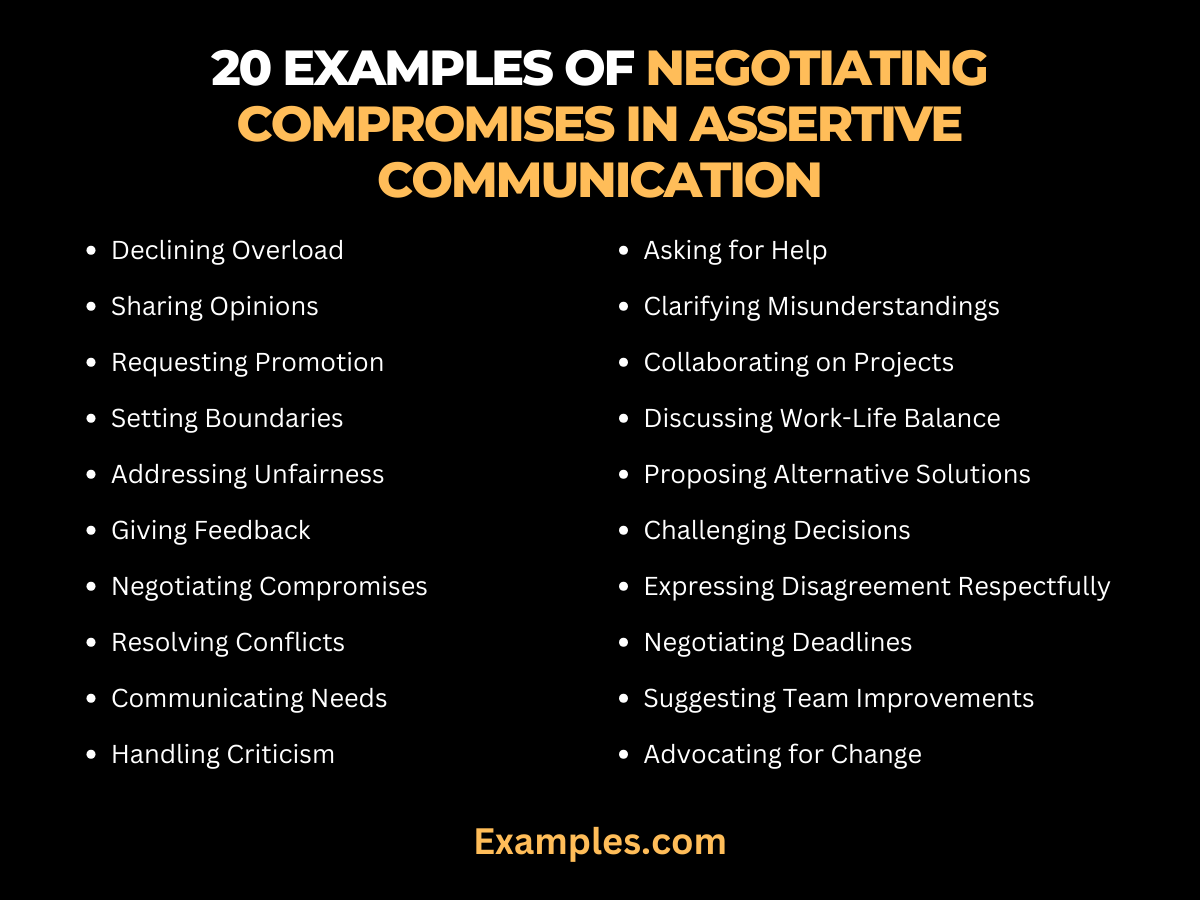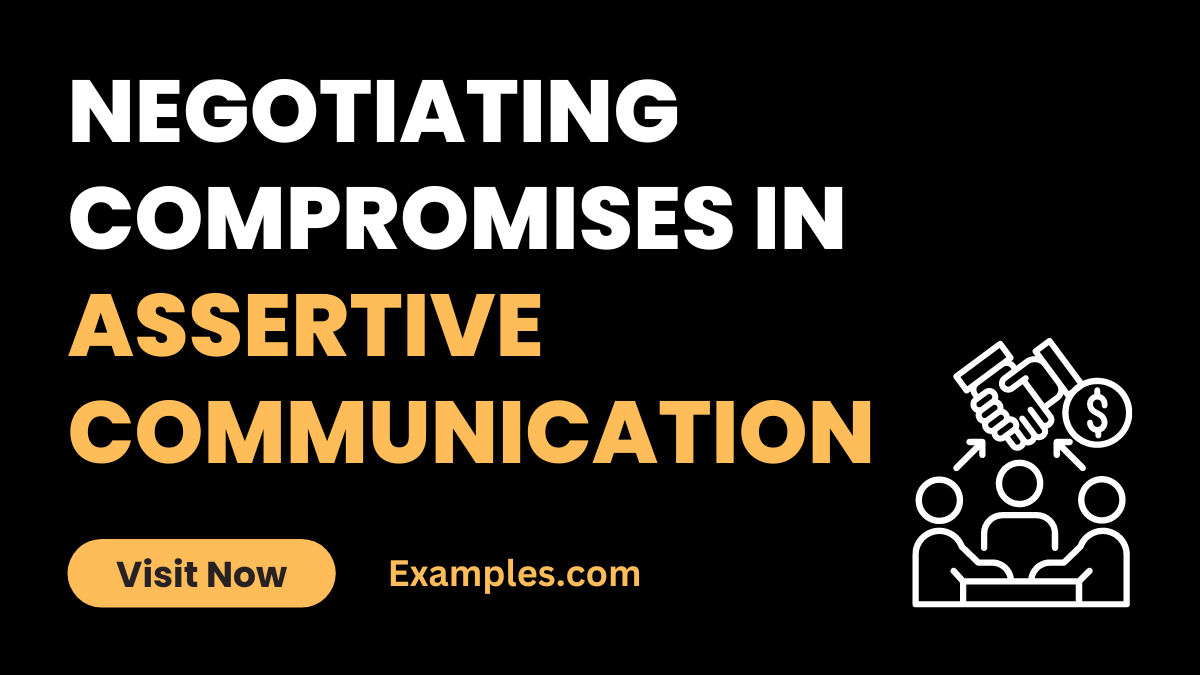19+ Negotiating Compromises in Assertive Communication Examples
In today’s fast-paced world, the ability to negotiate compromises through assertive communication is crucial. This complete guide delves into the essence of effective negotiation, illustrating with practical oral communication examples. We’ll explore how to articulate your needs, listen actively, and find common ground, all while maintaining a respectful and assertive stance. Whether in the workplace or personal relationships, mastering these skills can lead to more harmonious and productive outcomes. Let’s unlock the secrets to successful assertive communication together!
What is Negotiating Compromises in Assertive Communication?
Negotiating compromises in assertive communication is a skill where individuals express their needs, feelings, and opinions confidently and honestly, while also being open to understanding and valuing others’ perspectives. This approach aims to find a middle ground that respects all parties involved. It combines clear, direct language with empathy and respect, ensuring that everyone’s voice is heard and considered in the process of reaching a mutually agreeable solution. Assertive communication in negotiations is about balance: standing up for oneself without overpowering others.
20 Examples of Negotiating Compromises in Assertive Communication
Negotiating compromises in assertive communication involves skillfully balancing one’s own needs with those of others. It’s about finding mutually beneficial solutions while maintaining respect and empathy. This approach is crucial in diverse settings, from personal relationships to professional environments. Mastering this technique enhances interpersonal dynamics and fosters a cooperative atmosphere. Here, we explore 20 unique examples demonstrating how assertive communication can be effectively used to negotiate compromises.

- Declining Overload in Assertive Communication: “While I understand the urgency, I currently have full commitments. Can we discuss prioritizing these tasks?”
- Sharing Opinions in Assertive Communication: “I appreciate your perspective. Here’s another angle that might also work well for us.”
- Requesting Promotion in Assertive Communication: “I believe my contributions warrant consideration for a promotion. Can we discuss my career progression?”
- Setting Boundaries in Assertive Communication: “I value our work relationship, but I need to set certain limits to maintain a healthy work-life balance.”
- Addressing Unfairness in Assertive Communication: “This situation seems unbalanced. Let’s explore a fairer approach for everyone involved.”
- Giving Feedback in Assertive Communication: “Your work is impressive, though I have some suggestions for further improvement.”
- Negotiating Compromises in Assertive Communication: “I see your point. Let’s find a middle ground that satisfies both of our needs.”
- Resolving Conflicts in Assertive Communication: “We seem to have differing views. How can we come to an agreement that works for both?”
- Communicating Needs in Assertive Communication: “It’s important for me to express my needs clearly so we can work together effectively.”
- Handling Criticism in Assertive Communication: “I hear your concerns. Let’s discuss how I can address these issues.”
- Asking for Help in Assertive Communication: “I’m struggling with this task and would appreciate your expertise.”
- Clarifying Misunderstandings in Assertive Communication: “Let’s clarify to ensure we’re on the same page and avoid any miscommunications.”
- Collaborating on Projects in Assertive Communication: “Your input is valuable. Let’s collaborate to enhance the project’s success.”
- Discussing Work-Life Balance in Assertive Communication: “To maintain productivity, I need to balance my work and personal life.”
- Proposing Alternative Solutions in Assertive Communication: “I have an alternative suggestion that might be beneficial for us.”
- Challenging Decisions in Assertive Communication: “I’d like to understand the reasoning behind this decision to see if there’s a better alternative.”
- Expressing Disagreement Respectfully in Assertive Communication: “I respectfully disagree. Can we explore other options?”
- Negotiating Deadlines in Assertive Communication: “Given my current workload, a revised deadline would be more manageable.”
- Suggesting Team Improvements in Assertive Communication: “I have some ideas for improving our team dynamics.”
- Advocating for Change in Assertive Communication: “It’s important to consider these changes to improve our efficiency.”
Techniques for Negotiating Compromises in Assertive Communication
Mastering the techniques of negotiating compromises in assertive communication is essential for constructive interactions. This guide explores strategic methods to balance your needs with others’ in various situations. We delve into how to maintain assertiveness without being aggressive, ensuring mutual respect and understanding. These techniques emphasize clarity, empathy, and effective listening, which are key in reaching agreements that satisfy all parties. Embrace these methods to enhance your communication skills, making every negotiation a step towards positive outcomes.

- Prioritizing Key Issues: “Let’s identify the most critical aspects of this project to focus our discussion.”
- Helps to direct attention to the most important issues, avoiding unnecessary conflicts.
- Being Open to Alternatives: “I see your point. What other approaches could we consider to meet both our goals?”
- Shows willingness to explore different options for a mutually beneficial solution.
- Maintaining a Positive Attitude: “I’m confident we can find a solution that works for both of us. Let’s explore our options.”
- A positive approach can set the tone for a more collaborative discussion.
- Clarifying Misunderstandings Immediately: “To ensure I understand, you’re saying [restate their point]? Is that correct?”
- Prompt clarification prevents miscommunication and builds mutual understanding.
- Utilizing Pauses Effectively: “Let’s take a moment to think about this proposal before we continue.”
- Pausing allows for reflection and prevents hasty decisions.
- Expressing Needs Clearly and Respectfully: “I need more support in this area to achieve the desired results. Can we discuss how to make that happen?”
- Clearly stating your needs in a respectful manner fosters open communication.
- Avoiding Blame Language: “Instead of focusing on what went wrong, let’s look at how we can improve moving forward.”
- Steering the conversation away from blame to focus on solutions.
- Seeking Common Ground: “We both want this project to succeed. How can we align our efforts to ensure that happens?”
- Finding common goals can create a foundation for agreement.
- Reframing Negative Responses: “I understand your concerns. Let’s see how we can address them together.”
- Turning negative feedback into an opportunity for collaborative problem-solving.
- Practicing Patience: “I appreciate your perspective. Let’s take the time to thoroughly explore our options.”
- Patience indicates respect for the process and the other person’s input.
Assertive Communication Tips to Compromise
Mastering the art of compromise through assertive communication is vital for fostering positive relationships and achieving mutual satisfaction. This section offers ten unique and practical tips to enhance your assertive communication skills, enabling you to navigate conflicts and reach agreements effectively. By adopting these strategies, you can express your needs and understand others’ perspectives, leading to balanced and beneficial compromises. Each tip is paired with a distinctive example, providing clarity on how to apply these techniques in real-life situations.

- Clearly Define Your Needs and Boundaries: “I am willing to work late on weekdays, but weekends are reserved for family. Can we agree on this work schedule?”This statement sets clear personal boundaries while showing flexibility within defined limits.
- Use ‘I’ Statements to Express Yourself: “I feel stressed when deadlines are too tight. Could we set more realistic timelines?”This expression personalizes your concern without blaming others, fostering a constructive conversation.
- Practice Active Listening: “I hear that you’re concerned about project costs. Let’s explore cost-effective solutions together.”Acknowledging the other person’s concerns demonstrates understanding and openness to collaboration.
- Stay Calm and Composed: “Even though this is a heated topic, let’s try to discuss it calmly to find a solution that suits us both.”Maintaining composure during difficult conversations prevents escalation and promotes rational decision-making.
- Seek Win-Win Solutions: “If we combine elements from both our ideas, we might create a more comprehensive plan. What do you think?”Proposing a blended solution respects both parties’ contributions and aims for mutual benefit.
- Be Open to Alternatives: “While I prefer option A, I’m open to considering option B if it meets key criteria. Let’s compare them.”Showing flexibility to alternative solutions can lead to a compromise that satisfies all involved.
- Maintain a Respectful Tone: “I understand your point of view. Let’s discuss this with mutual respect and find a middle ground.”A respectful tone encourages positive interaction and reduces defensiveness.
- Focus on Problem-Solving, Not Blaming: “Instead of focusing on who’s at fault, let’s work together to solve this issue.”This approach shifts the conversation from blame to collaborative problem-solving.
- Encourage Open Discussion: “I value your input. Do you have any suggestions for how we can improve this situation?”Inviting others to share their thoughts fosters a sense of teamwork and open communication.
- Reiterate Understanding Before Responding: “So, your main concern is reliability. How about we address this by…?”
How do you negotiate effective communication?
Negotiating effective communication is a critical skill, especially when applying assertive communication techniques. This process involves a series of strategic steps designed to ensure clear, respectful, and productive interactions. Here’s how to do it:
- Start with Self-Awareness: Understand your own communication style. Are you naturally assertive, passive, or aggressive? Self-awareness is key to adjusting your approach for more effective interactions.
- Practice Active Listening: Effective communication is not just about talking; it’s equally about listening. Show genuine interest in the other person’s perspective. This means not only hearing their words but also understanding their intent and emotions.
- Use ‘I’ Statements: Frame your conversation around your perspective and feelings rather than making accusatory statements. For instance, say, “I feel overwhelmed by the workload” instead of “You are giving me too much work.”
- Be Clear and Concise: Assertive communication values clear, straightforward language. Avoid jargon or vague statements. Be concise yet complete in your communication to prevent misunderstandings.
- Maintain a Respectful Tone: Even when discussing contentious issues, keep your tone calm and respectful. Non-verbal cues like facial expressions and body language are also integral to maintaining respect.
- Seek to Understand, Then to be Understood: This principle from Stephen Covey emphasizes the importance of understanding the other party’s point of view before seeking to convey your own.
- Establish Common Ground: Identify areas of agreement before discussing differences. This creates a positive foundation and shows that you value the other person’s perspective.
- Offer Compromises: Be willing to give and take. Assertive communication isn’t about winning; it’s about finding mutually beneficial solutions.
- Set Boundaries: Clearly articulate your limits. It’s important to communicate what you are and aren’t willing to compromise on.
- Follow Up: Ensure that there is a mutual understanding of the conversation and agreed-upon actions. A follow-up can reinforce the discussion and clarify any lingering doubts.
What are the advantages of an assertive style for negotiations?
Adopting an assertive style in negotiations brings a host of benefits, making it a powerful tool in both personal and professional interactions. Assertive communication strikes a balance between passivity and aggression, allowing for more effective and equitable negotiations. Here are the key advantages:
- Promotes Honest and Open Dialogue: Assertive communication encourages individuals to express their thoughts and feelings openly and honestly. This transparency is crucial for understanding each party’s needs and expectations, leading to more effective problem-solving.
- Builds Respect and Trust: By communicating assertively, you show respect for yourself and others. This mutual respect builds trust, an essential component of successful negotiations.
- Reduces Conflict and Misunderstandings: Assertive communicators use clear and direct language, which helps prevent misunderstandings that could lead to conflict. Even when disagreements arise, assertive communication provides a framework for discussing these issues constructively.
- Creates Win-Win Situations: Assertive negotiation aims to find solutions that satisfy all parties. This approach moves away from the winner-takes-all mindset, fostering collaboration and compromise.
- Enhances Decision-Making: Assertive communication involves active listening and empathy, which are crucial for understanding different perspectives. This can lead to more informed decision-making, as all viewpoints are considered.
- Increases Self-Confidence: Regularly practicing assertive communication can boost your self-confidence. Knowing that you can express your needs and opinions effectively is empowering.
- Improves Relationship Dynamics: Assertive communication contributes to healthier relationships. It allows for honest exchanges and setting clear boundaries, which are vital for long-term, positive interactions.
- Facilitates Quick Resolution of Issues: With assertive communication, issues are addressed head-on rather than avoided or aggressively confronted. This direct approach often leads to quicker resolutions.
- Encourages Personal Responsibility: An assertive style promotes taking responsibility for one’s words and actions. This accountability is respected in negotiation settings.
- Cultivates Emotional Intelligence: Assertiveness involves understanding and managing one’s emotions as well as recognizing and respecting the emotions of others. This emotional intelligence is key in navigating complex negotiations.
Why is assertive communication important in negotiation?
Assertive communication plays a pivotal role in the dynamics of negotiation. It is a critical skill that balances the fine line between aggressive and passive communication, ensuring that all parties involved feel heard, respected, and valued. Here’s why assertive communication is a cornerstone in effective negotiation:
- Ensures Clarity and Directness: Assertive communication is clear and to the point, reducing the chances of misunderstandings and confusion. When each party clearly understands the other’s position, negotiations become more straightforward and focused.
- Fosters Mutual Respect: By communicating assertively, you show respect for your own needs and the needs of others. This mutual respect lays the groundwork for a constructive negotiation environment where all participants feel their viewpoints are valued.
- Builds Confidence: Being assertive boosts your self-confidence, empowering you to negotiate from a place of strength. This confidence is infectious, often leading to more open and productive negotiations.
- Promotes Honesty and Transparency: Assertive communicators are honest and transparent about their needs and expectations. This openness encourages a similar response from others, leading to more genuine and fruitful negotiations.
- Facilitates Problem-Solving: Assertiveness is solution-oriented, focusing on finding mutually beneficial outcomes. In a negotiation, this approach shifts the focus from winning to problem-solving, creating opportunities for compromise and collaboration.
- Reduces Aggression and Passivity: By avoiding aggressive or passive approaches, assertive communication minimizes conflict and resentment. This balance is essential in negotiations, as it ensures that discussions do not escalate into confrontations or lead to one party feeling overpowered.
- Encourages Active Listening: Part of being assertive is being a good listener. Active listening demonstrates respect for the other party’s perspective and contributes to a deeper understanding of their position, which is crucial in negotiations.
- Enhances Decision-Making: With assertiveness, decisions made during negotiations are more likely to be well-considered and informed, as all parties are encouraged to contribute their views and information.
- Strengthens Relationships: Effective negotiation is not just about the immediate outcome but also about maintaining positive relationships. Assertive communication helps build and sustain relationships based on trust and respect.
- Leads to More Satisfactory Outcomes: When negotiations are conducted assertively, the outcomes are often more satisfactory for all involved. This is because the process respects everyone’s needs, leading to compromises that are acceptable to all parties.



